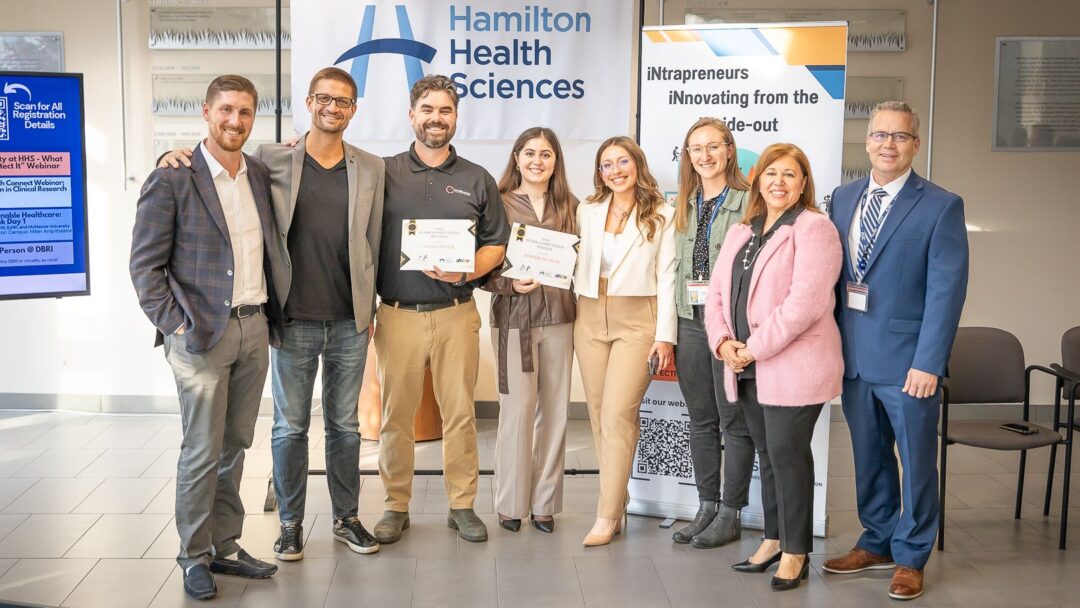DRIVE Spark funding competition highlights collaborations to advance health care innovations

HHS DRIVE Spark funding team recipients (Left to right): Medloaner, Power of Play, and SixthSense
By Eileen Hoftyzer
Three teams who participated in The Clinic @ McMaster’s health innovation programs have received funding through the Hamilton Health Sciences (HHS) DRIVE Spark funding competition. SixthSense, Power of Play Innovations and Medloaner were all awarded up to $50,000 that will help each start-up to advance their idea and grow their business.
Each of the three teams says that collaboration between teams with clinical and business expertise was essential in their success.
“As clinicians, we do not have formal business training, so we’re really thankful for the support of business teams who can advise on the business perspective,” says George Ioannidis, deputy director of the Geras Centre for Aging Research and part of the SixthSense team. “The business ecosystem is quite different from clinical practice. The more we are immersed in the business ecosystem and partnered with business experts, the more we learn.”
The DRIVE platform at HHS empowers health care providers, staff and patients to turn innovative ideas into impactful health care solutions. Through its SPARK Funding Competition, DRIVE fosters a culture of innovation by supporting diverse voices within the hospital network to share and develop ideas that improve patient outcomes and advance health care. The competition’s finalists were highly encouraged to participate in The Clinic’s six-week Health Innovation Bootcamp in early summer to help prepare for the final pitch competition, which took place in October.
Ioannidis – along with Alexandra Papaioannou, executive director of the Geras Centre for Aging Research and a geriatrician at HHS, and Patricia Hewston, assistant clinical professor and occupational therapist – have all participated in innovation programs at The Clinic related to other business ideas that provided skills and knowledge that proved valuable in developing the pitch for their most recent venture, SixthSense.
SixthSense is an evidence-based tool that measures gait speed in less than six seconds in clinical settings using radar-based technology. Gait speed is often referred to as the sixth vital sign and is a strong predictor of falls and hospital visits, yet many clinicians do not measure it as it time-consuming to do it properly. The SixthSense technology makes measuring gait speed easier and faster.
Papaioannou and team participated in the Health Innovation Bootcamp to develop the SixthSense pitch, and the team collaborated with Andrea Lee and other members of the Research, Development and Innovation department at HHS on developing the business model and plan. They say the bootcamp and the collaboration provided them with key advice and support in preparing their business strategy and pitch.
“Being able to connect to the right people at the right time was really important in the process,” says Hewston. “Everyone’s always so helpful, and we can always reach out to the innovation team with questions. It’s a great ecosystem to be a part of.”
With the investment from the DRIVE Spark competition, the SixthSense team is planning to patent the device and incorporate the company. They aim to have units available for clinical use in the near future, through their manufacturing partner Chirp Inc.
Deena Al-Sammak and Rooaa Shanshal, students in McMaster’s Faculty of Engineering, also participated in The Clinic’s programs prior to pitching their latest innovation, Power of Play, at the DRIVE Spark competition.
Working with Tara Packham and Hannah Bauer, physicians and therapists at HHS, Al-Sammak and Shanshal developed a device to measure grip strength in children. They say their clinical collaborators were essential in explaining the clinical need and providing perspective on how it would be useful in practice.
“As engineering students, there’s only so much of the problem and potential solution that we can truly understand. But a collaborator with a clinical perspective can make suggestions based on how it would be used and understand its impact, and even think of other applications for it,” says Al-Sammak. “That’s why it’s so important to work with your stakeholders when you’re designing something new.”
They will be using the investment from the DRIVE Spark funding to further develop the product, produce a prototype and prepare for clinical testing, with support from their clinical collaborators.
The third team to receive funding, Medloaner, is working to streamline how surgical devices are managed in hospital to reduce inefficiencies and reduce the risk of contamination. Co-founders Alex Paton and Kyrylo “Kip” Pogrebenko, along with Aaron Donst, head of strategic partnerships, say that the complexity of surgical supply chains make it challenging to track surgical kits, which can delay surgeries for patients. Their product uses artificial intelligence (AI) to optimize the supply chain of surgical kits.
Medloaner is now exploring several additional partnerships, including Innovation Factory’s SOPHIE (Southern Ontario Pharmaceutical and Health Innovation Ecosystem) program and Ontario Centre of Innovation’s Ready 4 Market program.
Awards and Recognition, Health Innovation, The Clinic“Without the collaborative partnership between Medloaner, McMaster University and Hamilton Health Sciences, we would not have been connected to several internal champions who have been instrumental in our success to date,” says Paton. “It has been invaluable to our team and organization.”

